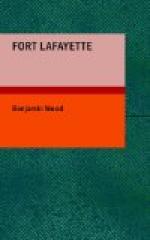“You can find nothing in the Constitution to intimate the right of secession.”
“Because its framers considered the right sufficiently established by the very nature of the confederation. The fears upon the subject that were expressed by Patrick Henry, and other zealous supporters of State Rights, were quieted by the assurances of the opposite party, who ridiculed the idea that a convention, similar to that which in each State adopted the Constitution, could not thereafter, in representation of the popular will, withdraw such State from the confederacy. You have, in proof of this, but to refer to the annals of the occasion.”
“I discard the theory as utterly inconsistent with any legislative power. We have either a government or we have not. If we have one, it must possess within itself the power to sustain itself. Our chief magistrate becomes otherwise a mere puppet, and our Congress a shallow mockery, and the shadow only of a legislative body. Our nationality becomes a word, and nothing more. Our place among the nations becomes vacant, and the great Republic, our pride and the world’s wonder, crumbles into fragments, and with its downfall perishes the hope of the oppressed of every clime. I wonder, Beverly, that you can coldly argue against the very life of your country, and not feel the parricide’s remorse! Have you no lingering affection for the glorious structure which our fathers built for and bequeathed to us, and which you now seek to hurl from its foundations? Have you no pride and love for the brave old flag that has been borne in the vanguard to victory so often, that has shrouded the lifeless form of Lawrence, that has gladdened the heart of the American wandering in foreign climes, and has spread its sacred folds over the head of Washington, here, on your own native soil?”
“Yes, Harold, yes! I love the Union, and I love and am proud of the brave old flag; I would die for either, and, although I reason with you coldly, my soul yearns to them both, and my heart aches when I think that soon, perhaps, they will no more belong to me. But I must sacrifice even my pride and love to a stern sense of duty. So Washington did, when he hurled his armed squadrons against the proud banner of St. George, under which he had been trained in soldiership, and had won the laurel of his early fame. He, too, no doubt, was not without a pang, to be sundered from his share of Old England’s glorious memories, the land of his allegiance, the king whom he had served, the soil where the bones of his ancestors lay at rest. It would cause me many a throb of agony to draw my sword against the standard of the Republic—but I would do it, Harold, if my conscience bade me, although my nearest friends, although you, Harold—and I love you dearly—were in the foremost rank.”
“Where I will strive to be, should my country call upon me. But Heaven forbid that we should meet thus, Beverly!”
“Heaven forbid?” he replied, with a sigh, as he pressed Harold’s hand. “But yonder comes little Phil, running like mad, to tell us, doubtless, that breakfast is cold with waiting for us.”




